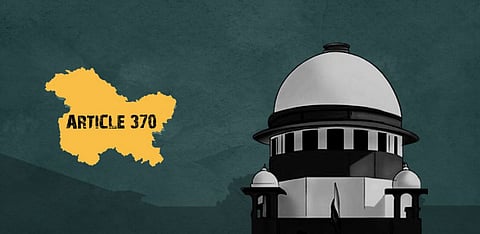

A five-judge Bench of the Supreme Court headed by Chief Justice of India Dr D.Y. Chandrachud and comprising Justices S.K. Kaul, Sanjiv Khanna, B.R. Gavai and Surya Kant, is hearing a batch of petitions challenging the August 5, 2019 decision to end the autonomy guaranteed to J&K under Article 370 of the Indian Constitution. We provide you the major highlights of each day and memorable quotes.
TO understand the legal history of the case better, read the curtain-raiser here.
Background
A batch of petitions, In Re Article 370, challenges The Constitution (Application to Jammu and Kashmir) Order, 2019 (Presidential Order C.O. 272), which used Article 370(1)(d) to extend all provisions of the Indian Constitution, including its "exceptions and modification" to apply in relation to J&K.
Article 370 (Article 306A of the Draft Constitution) was a temporary provision added to the Indian Constitution as a result of the Instrument of Accession signed on October 27, 1947, by the last Dogra Maharaja of J&K, Maharaja Hari Singh.
The document provided for special constitutional status to Jammu and Kashmir.
The Instrument of Accession was a declaration made by the erstwhile ruler of the then-independent princely state of Jammu & Kashmir and the then Governor General of India, Lord Louis Mountbatten, to conditionally accede to the dominion of India as explained by The Leaflet here.
On July 18, 1947, the British Parliament passed the Indian Independence Act. Under Section 1(1) of the Act, two independent sovereign countries, namely India and Pakistan, were to come into existence. The 584 'princely states' under British rule in the Indian subcontinent were given an opportunity to accede to either dominion.
The Act provided that a State shall be deemed to have acceded to a dominion if the Governor General of that dominion had signified his acceptance of an Instrument of Accession executed by the ruler of the State.
However, Jammu and Kashmir did not immediately accede to either of the dominions. The maharaja signed a standstill agreement with Pakistan, but India refused to sign a similar agreement.
Finally, under pressure from a popular rebellion against his rule and with an intervention of Pakistani tribesmen and, later, regular forces, the maharaja decided to conditionally accede to India. However, the terms of Instrument of Accession added that the accession shall not be deemed to be a commitment in any way to "acceptance of any future Constitution of India".
Highlights
Who said what
Highlights
Who said what
Highlights
Who said what
Highlights
Who said what
Highlights
Who said what
Highlights
Who said what
Highlights
Who said what
Highlights
Who said what
Highlights
Who said what
Highlights
Who said what
Highlights
Who said what
Highlights
Who said what
Highlights
Who said what
Highlights
Who said what
Highlights
Who said what
Highlights
Who said what
The case has been reserved for judgment.